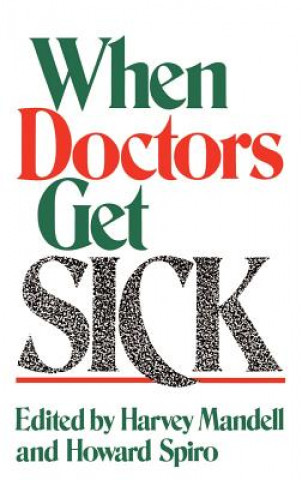
Code: 01376989
When Doctors Get Sick
by H.N. Mandell, H.M. Spiro
When a doctor gets sick, his status changes. No longer is his role de fined as deriving from doctus, i. e. , learned, but as from patiens, the present participle of the deponent verb, patior, i. e. , to suffer, with all the passiv ... more
- Language:
 English
English - Binding: Hardback
- Number of pages: 464
Publisher: Springer Science+Business Media
- More about this

122.83 €

Low in stock at our supplier
Shipping in 10 - 15 days
Potřebujete více kusů?Máte-li zájem o více kusů, prověřte, prosím, nejprve dostupnost titulu na naši zákaznické podpoře.
Add to wishlist
You might also like
-

Mindfulness and Acceptance for Addictive Behaviors
72.10 € -15 % -

When The Emperor Was Divine
10.42 € -28 % -

Old European Order 1660-1800
77.83 € -

Winchester Pipe Rolls and Medieval English Society
121.61 € -

International Law and Domestic Legal Systems
270.84 € -

Test by Fire
62.28 € -

The Secret Lives of Men and Women
28.32 € -9 % -

Database Reengineering and Interoperability
112.60 € -

Education and Social Justice
122.83 € -

Almost Periodic Stochastic Processes
122.83 € -

Kytička s Ružičkou
6.13 € -31 % -

Příběh mé duše
9.50 € -5 % -

SOUDOBÁ SOCIOLOGIE V.-TEORIE SOCIÁLNÍ ZMĚNY
14.82 € -2 % -

Staatseinung.
64.33 €
Give this book as a present today
- Order book and choose Gift Order.
- We will send you book gift voucher at once. You can give it out to anyone.
- Book will be send to donee, nothing more to care about.
More about When Doctors Get Sick
You get 304 loyalty points
 Book synopsis
Book synopsis
When a doctor gets sick, his status changes. No longer is his role de fined as deriving from doctus, i. e. , learned, but as from patiens, the present participle of the deponent verb, patior, i. e. , to suffer, with all the passive acceptance of pain the verb implies. From pass us, the past participle, we get the word passion, with its wide gamut of emotional allusions, ranging from animal lust to the sufferings of martyrs. It is the connotation, not the denotation, of the word that defines the change of status. When a doctor is sick enough to be admitted to a hospital, he can no longer write orders; orders are written about him, removing him from control of his own situation. One recalls a sonnet from W. H. Auden's sequence, The Quest, which closes with the lines: Unluckily they were their situation: One should not give a poisoner medicine, A conjuror fine apparatus, Nor a rifle to a melancholic bore. That is a reasonable expression of twentieth-century skepticism and ra tionalism. Almost all medical literature is written from the doctor's point of view. Only a few medically trained writers-one thinks of Chekhov's Ward Six-manage to incorporate the patient's response to his situa tion. Patients' voices were not much in evidence until well into the twentieth century, but an early example is John Donne's Devotions upon Emergent Occasions (1624).
 Book details
Book details
Book category Books in English Medicine Medicine: general issues Health systems & services
122.83 €
- Full title: When Doctors Get Sick
- Author: H.N. Mandell, H.M. Spiro
- Language:
 English
English - Binding: Hardback
- Number of pages: 464
- EAN: 9780306426537
- ISBN: 0306426536
- ID: 01376989
- Publisher: Springer Science+Business Media
- Weight: 1890 g
- Dimensions: 234 × 156 × 31 mm
Trending among others
-

Why Has Nobody Told Me This Before?
16.05 € -29 % -

It's Ok That You're Not Ok
16.87 € -17 % -

Oxford Handbook of General Practice
48.06 € -

Point of Care Ultrasound
106.26 € -

Oxford Handbook of Clinical Haematology
58.70 € -

Checklist Manifesto
15.23 € -21 % -

Surviving Schizophrenia
11.45 € -28 % -

Family Therapy Treatment Planner, with DSM-5 Updates, 2e
72.71 € -

Understanding the Orofacial Complex
78.03 € -

Infectious Disease Diagnosis
144.82 € -

CBT Toolbox for Children and Adolescents: Over 220 Worksheets & Exercises for Trauma, ADHD, Autism, Anxiety, Depression & Conduct Disorders
29.96 € -32 % -

Oxford Handbook for the Foundation Programme
51.23 € -

Anatomy & Pathology:The World's Best Anatomical Charts Book
36.10 € -7 % -

Checklist Manifesto
27.91 € -23 % -

Toward A Psychology of Being-Reprint of 1962 Edition First E
8.68 € -

Stress: Concepts, Cognition, Emotion, and Behavior
169.68 € -

Twelve Patients
15.54 € -24 % -

Holidays in Soviet Sanatoriums
24.74 € -26 % -

Oxford Handbook of Clinical Diagnosis
45.51 € -

Atlas of Trichoscopy
322.39 € -4 % -

Schizoaffective Disorder Simplified
21.47 € -

Silence the Voices
23.41 € -25 % -

General Practice - Clinical Cases Uncovered
66.27 € -

Alpha-Theta Neurofeedback in the 21st Century
72 € -

Acupuncture for Pain Management
144.82 € -

Truth About Big Medicine
78.24 € -

Loving Someone with OCD
26.69 € -15 % -

Body Keeps the Score
26.38 € -25 % -

Silent Twins
10.42 € -28 % -

A Fractured Mind
27.50 € -

Five Patients
10.42 € -28 % -

International Trauma Life Support for Emergency Care Providers
95.32 € -

Oxford Handbook of Sport and Exercise Medicine
51.23 € -4 % -

Methods for the Economic Evaluation of Health Care Programmes
73.84 € -

Atlas of Trichoscopy
235.55 € -4 % -

Polyvagal Theory and The Pocket Guide to the Polyvagal Theory, Two-Book Set
71.08 € -8 % -

Innovator's Prescription: A Disruptive Solution for Health Care
18.50 € -28 % -

Ultrasound for Primary Care
97.88 € -10 % -

Cecil Essentials of Medicine
86.52 € -4 % -

Lifestyle Medicine
133.88 € -

Urgent Care Dermatology: Symptom-Based Diagnosis
74.96 € -

Clinical Psychology: A Very Short Introduction
10.73 € -18 % -

Prescription for Psychiatry
43.56 € -

Improvised Medicine
110.66 € -

Mental Health, Social Mirror
50.82 € -4 % -

Beyond the Checklist
14.92 € -22 % -

Mille the Cat has Borderline Personality Disorder
12.78 € -4 % -

Pocketbook of Differential Diagnosis
39.57 € -14 % -

Wellness Coaching for Lasting Lifestyle Change
22.19 € -28 %
Collection points Bratislava a 2642 dalších
Copyright ©2008-24 najlacnejsie-knihy.sk All rights reservedPrivacyCookies


 15549 collection points
15549 collection points Delivery 2.99 €
Delivery 2.99 € 02/210 210 99 (8-15.30h)
02/210 210 99 (8-15.30h)